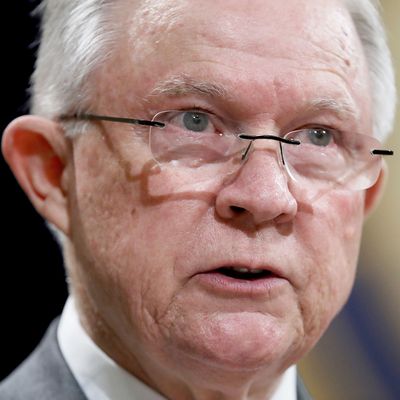
It’s obviously no secret that Attorney General Jeff Sessions’s relationship with his former friend the president of the United States has deteriorated to the point where it is generally assumed Trump would fire the Alabamian if he didn’t fear the political and legal fallout. Earlier this week, the restless POTUS refocused on Sessions with a demand that he end the Mueller investigation immediately:
This is the language of a monarch annoyed with a rebellious underling and giving him a public tongue-lashing. It’s not consistent with any past president–Cabinet communications on record.
But Sessions’s journey to the outer darkness of Trumpworld may get even worse, as reflected by this strange tweet from Trump enabler Jerry Falwell Jr.:
Attacking Sessions for not doing exactly what Trump wants right now is one thing, though his original sin, his recusal from the investigation that is now associated with Special Counsel Robert Mueller, can’t just be revoked. But what Falwell is trying to do is to retroactively disgrace Sessions as having never loved MAGA from the get-go.
This is a pretty remarkable piece of historical revisionism. Sessions was the first senator, and the highest-ranking official generally, to endorse Trump’s run for the GOP presidential nomination, not long after Falwell’s own endorsement of the mogul. He was almost universally acknowledged as a pioneer, along with Representative Steve King, of the harsh immigration stance that was Trump’s signature. He was close to Trump’s impresario Steve Bannon, and to Breitbart News. And even before endorsing Trump he gave the campaign his valued aide Stephen Miller, who continues to shape the administration’s policies and messaging. As Politico Magazine explained during the campaign, the duo (along with Bannon) largely created Trumpism as we know it:
Miller is a 30-year-old policy wunderkind from liberal Santa Monica, California, who rose early through conservative ranks; Sessions, a 69-year-old ultraconservative senator from a small town in Alabama. But if you’re looking to understand where Trump’s particular combination of fiery nativism, anti-immigrant fervor and “America First” foreign policy connects to modern politics, there’s a strong case to be made that this unlikely team from Capitol Hill has a lot to do with it: Trump is running on ideas that Sessions has been pushing for years—now crafted by Miller into a message for the candidate.
To this day, Sessions is loyally promoting the same Trump policies over which the two men bonded during the 2016 campaign. There is no sense in which he can be said to be “pretending” to be pro-Trump. But he has run afoul of the Boss’s determination to avoid any accounting for his campaign’s possible interaction with Russian agents and operatives, and so he’s not only being exiled from the inner circle and threatened with firing, but is being treated as having been a budding traitor all along.
The erasure of public figures from their actual role in history was a trademark of the Soviet Union under Stalin, in which many Old Bolsheviks jailed, tortured, and murdered by the dictator and his party were expunged from history books and even photos. Sessions doesn’t risk a fate as lurid as physical liquidation. But his service to the Trump political enterprise (“I told Donald Trump this isn’t a campaign, this is a movement,” he memorably said at the Alabama rally where his endorsement was formally conferred) may well be expunged in the final loyalist narrative. It’s a tough turn for an aging ideologue who once appeared to have found his soul mate in the raging demagogue from New York. But Sessions is hardly in a position to plead innocence about the president’s character.






























